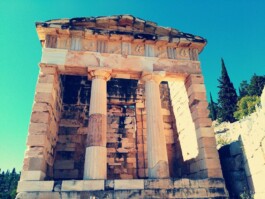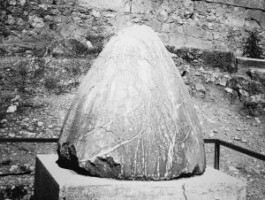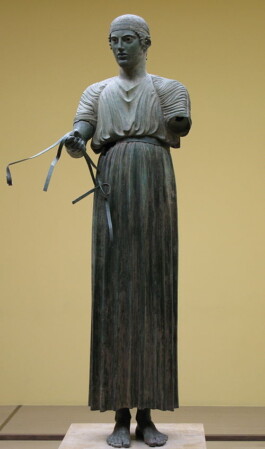POEM FOR DELFI

During a wintery, rain-swept circular journey around Germany I’ve found such amazing friendship, warmth and connection of heart to finish a poem about my trip to Delfi. The scenery there couldn’t be more contrasting with the damp soil and towering forests of the German countryside, the dark afternoons and efficient streets of the cities… but it took me back to this treasure of the ancient, which I was reminded is an architectural symbol of the feminine, the ancient Greek name Delfi meaning ‘womb’.


Sea-level
From Galaxidi, an Apollonian sky
Shifts, plumes and beckons
Over where distant Delfi glitters,
Pulsing gently under the dazzle;
White egg-shell crumbled
Into a red and olive palm,
A giant up-turned hand,
Hanging legs of fertile valley.
Mountain village:

Old broken porcelain
Of discarded doll’s house;
This childish image swims
Through a smudge of tears,
Rainbowed by the lens
Of the rumbling bus window;
The bumping road a stairway
To my own forgotten attic.
The ruins:

At the life-size peak
It is nothing of the kind;
A lobster-burnt woman,
Fat as a Russian babushka
Swears in Manhattan slang
At a model Korean tourist
Whose selfies are blocking
Her view of the Oracle.
Birdseye view:

Is it my stereotype
That scrabbles out
Beyond the boundary fence
To a scrub of no-mans-land?
Here perched, a foreign bird,
Silently scanning the lofty rift,
I watch a throng of ravens
Set sail on the lifting heat.
The call:

Black then grey then black,
The wing and underwing
Throw shadows against
The light, a unison of flight,
One seraphim of sound,
Spilling messy, drunken swirls
Onto the dedicated ground;
Nature’s own dancing shaman.
The offering:

Temple, amphitheatre, stadium,
And the thousand treasures
Borne up from the ancient soil;
All cast a flame of praise —
My votive appearing at my feet,
As if cast from the heavens —
A shock of golden crocuses,
Racing torches of nature’s glory.
γνῶθι σεαυτόν: *

To feel under foot and heart
A culture unmade to dust,
Is to descend to earth;
To see a livelihood or love
Blown as a feather ‘gainst sky
Is to know thyself again,
These the hands upon the plough,
This the voice that doesn’t turn back.

* The ancient greek aphorism “know thyself” or “gnothi seauton” is one of the Delphic maxims and was inscribed in the pronaos (forecourt) of the Temple of Apollo at Delphi according to the Greek writer Pausanias. The phrase was later expounded upon by the philosopher Socrates who taught that: “The unexamined life is not worth living.” (Wikipedia)
Copyright © 2020 Rebecca Brewin, all rights reserved. rebecca@handtoearth.net +44 (0) 789 693 6625 Return to top